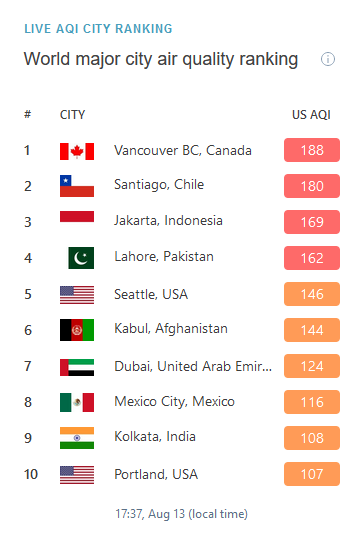Vancouver air quality ranked worst of world's major cities; drone video shows smoky skies
Smoky skies blocked out Vancouver's mountain views on Friday as residents of the region experienced the worst air quality of all major cities in the world.
According to an air quality website, the air in the Vancouver area was worse on Friday afternoon than in any of the other cities it monitors.
IQAir said the city's air quality index (AQI) had reached 188 by 2:30 p.m., pushing it ahead of Santiago, Chile, which had a score at that time of 180.
An interactive map of the region's air quality on AirIQ's website suggested the quality differed across Metro Vancouver, with some of the worst air quality noted in Burnaby and New Westminster.
Areas closer to the coastline had significantly lower AQI numbers.
Even in the City of Vancouver itself, values varied. A reading taken on Gravely Street near Commercial Drive in East Vancouver had a score of 210, while the AQI on West 14th Avenue near Oak Street was just 72.
Toronto, the only other Canadian city on the list of 94, came in 19th overall with an AQI of 76.

IQAir called Vancouver's air pollution "unhealthy," saying it was 12 times above the exposure level recommended by the World Health Organization.
The main pollutant in the region's air as of the update was PM2.5, or fine particulate matter. The name refers to airborne solid or liquid particles with a diameter of 2.5 micrometres or less, an air quality advisor from Metro Vancouver officials explained.
Because of its size, it can easily penetrate indoors, the region said in its advisory, which is also in place for the Fraser Valley.
The high concentration of PM2.5 is expected to continue through at least Saturday, the region said.
The air quality plummeted in the region as wind pushed in smoke from the wildfires burning both in B.C. and south of the border in Washington.
Video from CTV News Vancouver's drone showed the smoke was thick enough to reduce visibility, blocking out mountain views in some areas.
Until the air quality improves, those with chronic underlying medical conditions or infections including COVID-19 should try to reduce time outdoors.
According to Metro Vancouver, exposure is a concern especially for people with lung or heart disease, asthma and other conditions, as well as older adults.
At the same time, B.C. is experiencing another heat wave.
The City of Vancouver opted for the first time ever to open its cooling centres overnight after health officials raised a weather warning to Level 2, declaring an extreme heat alert.
According to a meteorologist, wildfire smoke can be a bit of a wildcard. Thick smoke can reduce temperatures by as much as 10 degrees, Armel Castellan told CTV News.
CTVNews.ca Top Stories

BREAKING Poilievre to submit letter to Governor General asking to recall House for confidence vote
Conservative Party Leader Pierre Poilievre announced that he will submit a letter to the Governor General asking to recall the House for a confidence vote.
WATCH LIVE 'I understand there's going to be a short runway,' new minister says after Trudeau shuffles cabinet
Prime Minister Justin Trudeau added eight Liberal MPs to his front bench and reassigned four ministers in a cabinet shuffle in Ottawa on Friday, but as soon as they were sworn-in, they faced questions about the political future of their government, and their leader.
Quebecer convicted of killing partner, two children sentenced
A Quebecer convicted in a triple murder on Montreal's South Shore has been sentenced to life in prison without chance of parole for 20 years in the second-degree death of Synthia Bussieres.
Poilievre to Trump: 'Canada will never be the 51st state'
Conservative leader Pierre Poilievre is responding to U.S. president-elect Donald Trump’s ongoing suggestions that Canada become the 51st state, saying it will 'never happen.'
A car has driven into a group of people at a Christmas market in Germany
A car drove into a group of people at a Christmas market in the eastern German city of Magdeburg on Friday, German news agency dpa reported.
Guelph man facing assault charge after police say he spat in roommate's face during disagreement over cat
A fight between roommates has led to an assault charge for a Guelph man.
Joss Stone says she's discovered she's pregnant – just weeks after adopting a baby
Joss Stone has revealed that she is pregnant, just weeks after she and her husband adopted a baby boy.
A new book about Chrystia Freeland just came out. Here's what we learned
A new book about Chrystia Freeland has just come out, after the publishing company sped up its release date by a few months. CTV News sifted through the book and pulled out some notable anecdotes, as well as insights about Freeland's relationship with the prime minister.
Police say break-and-enter suspects were in Canada for 'purpose of committing criminal offences'
Five Chilean nationals who police believe were in Canada for 'the purpose of committing criminal offences' have been charged in connection with half a dozen break-and-enters across the Greater Toronto Area (GTA).































